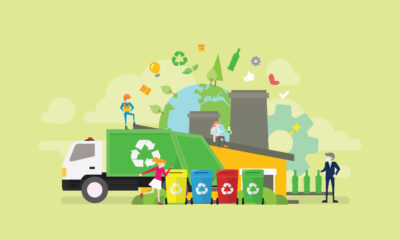

Environment
3 Ways the Trucking Industry Can Become Greener
When you think about industries that are green, trucking is probably not one of the first ones that come to mind. In fact, it would probably be on most people’s list of “least green” industries.
But it may not be fair to make such an assumption about commercial trucking, at least for the future. All it would take is a few simple tweaks to get that industry on board with the best of us.
Three Actions Trucking Companies Can Take
“Today, roughly 70 percent of our consumer goods are shipped via truck, and even the environmental groups that rail hardest against the industry don’t have comprehensive alternatives to offer,” Jesse Hirsch writes for PacificStandard.
“Air transport is too costly. Cargo trains are effective, but limited by narrow shipping routes and dwindling numbers. Similarly, aquatic shipping has its benefits — most overseas imports still arrive by boat — but (at the risk of explaining something most first graders understand) there simply isn’t water everywhere.”
In other words, for better or worse, trucking is going to remain one of the major players in freight transport for the foreseeable future. Since that’s the case, here are three basic things that trucking firms and individual drivers can do to alleviate some of the environmental burdens we all place on the planet.
1. Regular Maintenance
One of the biggest concerns with large trucks is their safety record. Big semi trucks carry a fatality rate of 10.1 deaths per 1,000 vehicles, which is three times higher than the average for all other vehicles.
Although distracted driving and other external factors are part of the reason, the most common cause of large truck incidents is the lack of proper maintenance (especially with brakes). It’s also true that ineffective maintenance is one of the leading contributors to poor fuel efficiency. Proactive maintenance at pre-determined intervals could alleviate both of these issues and ensure you keep your trucking authority untarnished.
2. Stop Idling
If you visit a truck stop or gas station, you’re apt to notice that many of the rigs in the parking lot are idling in the area; that is, they’re running their engines for no apparent reason. Not only is this costly, but it’s also highly inefficient.
When a truck idles, it can consume a full gallon of fuel per hour. Furthermore, the American Trucking Association reports that one hour of idling per day over a full year results in the equivalent of 64,000 miles in engine wear.
By reducing idle time, trucks could save significant amounts of fuel and lower their impact on the environment.
3. Optimize Routing
Many of the largest trucking companies have already figured this out, but smaller fleets can also benefit from optimized routing. By choosing the shortest, most convenient routes, trucking firms can save fuel and maximize productivity.
“The simplest, most effective way to optimize routing is with GPS vehicle tracking tools,” former fleet supervisor Oswaldo Flores explains. “By locating drivers closest to a certain delivery spot and choosing them to complete the job, or by identifying high-traffic areas for efficient pickups, telematics help fleets maximize their resources and eliminate waste at the same time.”
Along this same line of thinking, drivers could be rewarded for being more efficient. This would encourage better driving habits, and it’s been shown to reduce waste.
Small Strides Produce Big Results
Better technology will solve some problems, but there’s only so much that innovation can do. The onus is ultimately on both trucking companies and individual drivers to make better decisions.
Trucking companies need to invest in proper resources and develop big-picture plans that maximize efficiency. Individual truckers have to improve their driving habits and make smarter choices.
The steps described in this article offer a good starting point, but they certainly aren’t everything that could be done. The sooner the trucking industry gets serious about going green, the more positive change we’ll see.


 Environment12 months ago
Environment12 months agoAre Polymer Banknotes: an Eco-Friendly Trend or a Groundswell?

 Features11 months ago
Features11 months agoEco-Friendly Cryptocurrencies: Sustainable Investment Choices

 Features12 months ago
Features12 months agoEco-Friendly Crypto Traders Must Find the Right Exchange

 Energy11 months ago
Energy11 months agoThe Growing Role of Solar Panels in Ireland’s Energy Future



















